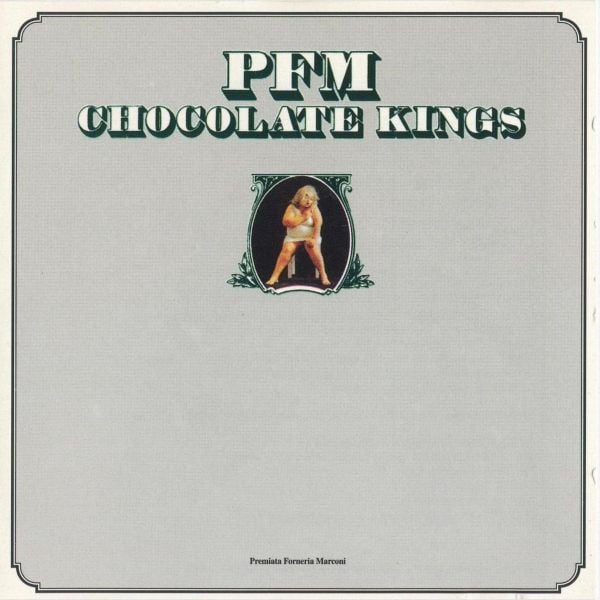21 December 2011
Premiata Forneria Marconi - 1975 - Chocolate Kings
There are two clear epochs for progressive symphonic rock in the 1970s, one during King Crimson's reign and a second after King Crimson. The second half of the seventies is marked by the adoption of new technologies that relegated the mellotron and greatly improved the quality of studio recordings. Chocolate Kings by Premiata Forneria Marconi (PFM) was one of the first records to clearly enter into this second progressive symphonic phase. This was also the first PFM record I ever listened to, and while much appreciating their earlier discography this is the one I continue to listen most frequently.
This record has two main features that divide it apart from the earlier PFM discography: the abandonment of the mellotron and the addition of a new singer: Bernardo Lanzetti. By leaving the mellotron the band loses the epic touch characteristic to their most acclaimed works, but gain a tempo dynamics that at this time had not been fully explored. The mellotron is an instrument that to be fully appreciated requires certain tempo signatures that somewhat constraint song structure; PFM where not afraid to experiment and go beyond that. They retain the prominent presence of one of the characteristic instruments of the earlier days of prog, the electric organ, but use it an much more versatile fashion, perhaps at the image of what Keith Emerson or Hugh Baton were doing at the time. And then there is Lanzetti, both good and evil. On the one side he is a good English speaker, bringing that internationality that the band seek for the years before; the lyrics are thus more coherent and bond naturally with the melodies. On the other side Lanzetti's voice constantly falls into an over-vibrato that is really hard to listen, requiring a great deal of habituation.
Finally it must be noted that the recording quality of Chocolate Kings is well ahead of previous recordings. All instruments sound much cleaner, resulting in a more modern sound and overall a markedly different style. I especially feel this with the bass guitar, that sounds more lucid and precise than ever, underpinning the dynamic tempo changes the band dives into.
From Under
This opening track immediately proves that this record is like nothing PFM had done in the past and possibly no other band of the time. Going through several moments that provide for Lanzetti's work, the song is underpinned by a clean, fast tempo melody where all musicians follow the same catchy line. The organ in some moments shows some influence from Van Der Graff Generator, though in its structure the track is not really related to that band's work. It is a major display of musicianship and fresh creativity, while at the same time providing comfortable references for the less technical listener. The scene is set for a great album.
Harlequin
My favourite song of the album, that starts by a beautiful mellow introduction with bass, nylon string folk guitar and the electric piano. During this section Lanzetti opts for lower tones where the over-vibrato almost disappears, resulting in a moment of great density. But it all jumps into a whirlwind with the organ commanding another highly dynamic, fast tempo piece. After a long, exhilarating excursion the song slowly winds down back to the initial melody, this time leaded by the flute; a fabulous finale.
Chocolate Kings
Another high-tempo song commanded by an organ melody. The other musicians have plenty of room to stretch their legs, delivering a track that while not outstanding is perfectly framed in the whole musical concept of the album.
Out Of The Roundabout
An exquisite intro is provided by the nylon string guitar again accompanied by tame vocals and an atmospheric electric piano. The structure is similar to the one in Harlequin, but with some alternation between high-tempo sections and tamer, atmospheric intermissions. This time relegating the organ to the ending stages, the band manages to achieve another major track with several high points melodic-wise. Once again the band returns back to the initial melody with the folk guitar to close the track, building a comfortable sense of completeness.
Paper Charms
The band tries to pull an epic ending to the album, that while not materializing, is not dissonant from the remainder of the songs either. Again the organ provides the backbone of the song together with the bass; on these the violin and guitar build several short variations of great creativity. Closing, the band tries hard to recover the emotion of earlier records, but is clearly boycotted by Lanzetti's awkward vocals; though it can't be said it doesn't work either, it is just different.
This is one of the alba that easily leaves one watering for more, it really fells some more of that great music could be had.
The Veredict
On the negative side I can only point to Lanzetti's vocals, which may make this a record really hard to get into. But it can't be said Lanzetti is a bad singer, he has a good range , sings on key and seems well conscious of his place in each song. In the end it may all resume to a matter of taste.
This record is very compact and without any weak moments that can be pointed out, it constantly delivers with great creativity and musicianship. Adding to this the seminal grounds it broke at the time I have no doubts in giving it five stars. I can understand that pure fans may find this record somewhat disappointing, PFM takes a totally different path from that trailed with the three earlier LP, that gave the band worldwide recognition. But considering the symphonic genre in general I find this a very important record that fully deserves the title of Masterpiece.
Subscribe to:
Post Comments (Atom)

No comments:
Post a Comment